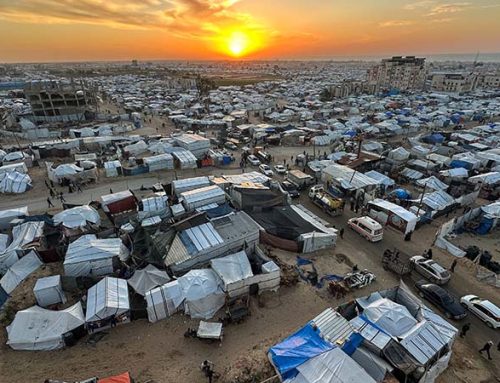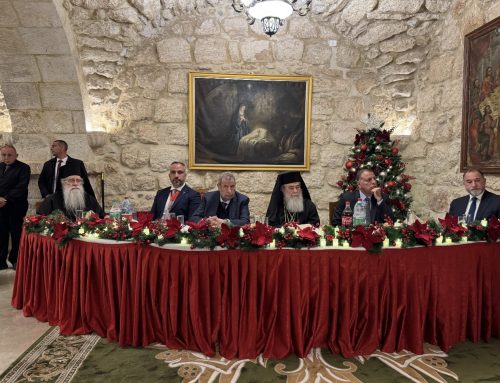“In addition to hitting the airports in Damascus and Aleppo, many Civilians Die because of these attacks, which in the past were limited only to military areas.” With these words, Ayham from Damascus recounts the difficulties and fears of those in Syria today suffering the indirect consequences of the ongoing conflict in Gaza.
Syria context
We have often talkedabout Syria, today we are doing it again to tell the story of the new wave of conflict that is hitting Syria, exacerbating an economic and social crisis that is already at an all-time high.
Syria, a country already battered by decades of conflict and hit hard by last year’s terrible earthquake, has once again found itself at the center of a new wave of violence after the start of Israel’s war on Gaza. The escalation of hostilities between Israel and Hamas has led to an intensification of clashes on Syrian soil with a significant increase in Israeli bombing and attacks from different factions.
The consequences of this new phase of war have been felt across the country, with a series of air and ground attacks hitting strategic targets and key infrastructure. In particular, the Israeli attacks caused significant damage to Damascus airport, making the international airport unusable for a long period.
Added to all this are the country’s internal problems. While anti-government demonstrations against Iranian influence continue in the southern region, armed attacks attributed to Islamic State cells continue in the central region.
In this precarious context that stains the future of the country with uncertainty, the Syrian civilian population is facing an unprecedented crisis. The lack of security and precarious economic conditions push many Syrians to seek refuge elsewhere, contributing to the strong migratory flow across national borders to Europe.
The aftermath of the conflict
Israeli raids have increased in Syria, especially in Damascus, due to Iranian attacks targeting U.S. forces since last October. The situation became more dangerous when these attacks began to target residential buildings inside Damascus. In addition to hitting the airports in Damascus and Aleppo, many civilians die as a result of these attacks, which in the past were limited only to military areas.
The economic situation is also collapsing. The government has increased salaries by 50% to around $19 as a minimum for civil servants, but not in the private sector. However, this increase in salaries has been followed by an increase in the price of fuel, which has tripled since the beginning of the year. As a result, the cost of living has risen sharply. For example, a family of five needs at least $400 a month just to survive, the minimum wage is $19, if you’re lucky, it’s $25 or $30 if you work in government. These figures are worth nothing because of the difficulties of the current situation. Prices have also increased between 50% and 80% for no reason at all. Despite the fact that the value of the dollar has been stable since the beginning of the year, prices are rising and no one knows the reasons. Inflation in 2023 has increased by more than 165%. Corruption is rife everywhere. The government is completely powerless and absent. There is every interest in keeping the situation as it is because there are no positive signs from the government that show a willingness to change. Because of these difficulties, a new big wave of immigration has begun, but this time not of individuals, but families, traders and industrialists due to the country’s economic instability and limiting laws that change day by day. If you have a work or business project, here in Syria you can’t make predictions beyond three to six months. Everything changes, everything is changing rapidly from month to month as far as commercial activities, projects, the industrial sector are concerned. Banks are also collapsing. There is no cash, so no one can use the Lira or send transfers. Most merchants use the Lira in cash because there is no longer trust in banks. The economic situation is becoming more and more complicated. In addition, the World Food Program will stop distributing food in Syria in 2024 due to lack of funding. The situation in Syria is deteriorating fast and we don’t even have hope that it will get any better.”
Francis’ testimony
Pro Terra Sancta has been active in the country for several years with support and assistance projects in both Damascus and Aleppo. “The impact of October 7 on people’s consciences here in Syria has been significant and persistent over time, albeit with an intensity that has progressively diminished.” These are the words of Francis, one of our collaborators who lives and works closely with the Syrian civilian population.
“The event has contributed,” Francis continues, “to reducing the prospects for economic and social openness and recovery in the area, limiting movements and negatively influencing the already struggling economy. The persistent economic crisis, inflation and rising food prices have further aggravated the negative situation of recent months. The instability in Lebanon, with the decrease in flights and the risk of a possible invasion, has also further worsened the local climate, affecting travel and tourism. Despite this, people continue to live their lives, adapting to circumstances. The involvement of the various actors in the conflict, with attacks aimed mainly at Damascus, contributes to the uncertainty and instability of the region. Despite this, the large-scale impact on public consciousness appears marginal, although concern remains high, especially in relation to media coverage.”
The words of Ayham and Francis describe the situation of those living in Syria today. Pro Terra Sancta is constantly active on the ground to support and assist the population. In this time of uncertainty and difficulty, help us to support Syria.
By:proterrasancta






